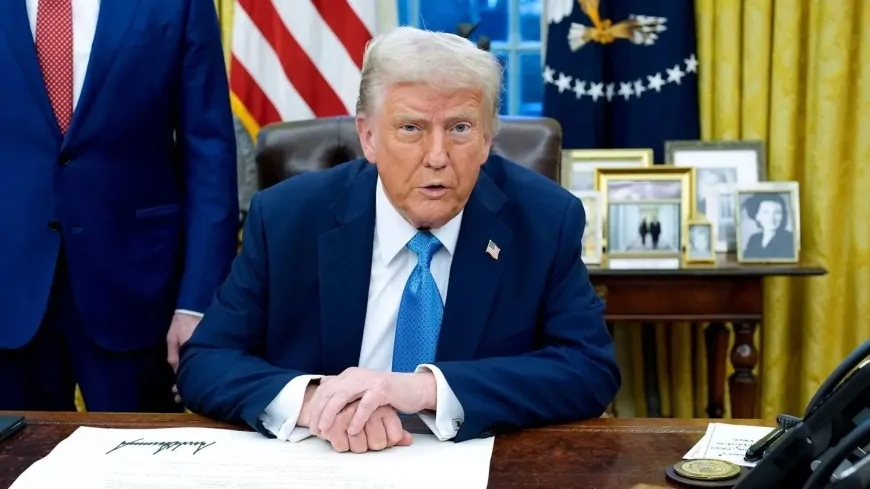Live Updates: Trump Imposes 25 Percent Tariff on Steel and Aluminum Imports CFPB Shutdown
Follow real-time updates as Trump enforces a 25 percent tariff on steel and aluminum imports, Vance criticizes federal rulings, and CFPB faces shutdown orders.

President Donald Trump has announced a 25% tariff on all steel and aluminum imports, a move set to take effect on Monday. He emphasized that these tariffs would apply universally, including to Canada and Mexico, two of the United States' closest allies and largest trading partners. Additionally, Trump hinted at further trade measures later in the week aimed at adjusting tariff rates to align with global standards.
Also Read: Trump Prepares to Announce New Tariffs Next Week, Aiming for Fair Trade
Vice President J.D. Vance has openly criticized federal judges for blocking several of the Trump administration’s executive actions, calling these rulings “illegal.” His statements have raised concerns about whether the administration will comply with federal court decisions. Trump also addressed a particular ruling that restricted Elon Musk’s access to Treasury Department data, stating that judges should not have the authority to make such decisions.
Meanwhile, Russell Vought, a key architect behind Trump’s plan to reshape the federal government, has ordered the shutdown of the Consumer Financial Protection Bureau headquarters for an entire week. In a directive sent to all employees, he instructed them not to perform any work tasks unless they received written approval from the agency’s chief legal officer. The union representing CFPB employees has since filed a lawsuit to challenge the order.
Follow live updates from here for the latest developments...
Key Moments
- Trump imposes a 25 percent tariff on all steel and aluminum imports.
- JD Vance criticizes federal judges for blocking Trump administration actions.
- CFPB ordered to shut down for a week under Russell Vought’s directive.
- Elon Musk faces legal hurdles in accessing Treasury Department data.
-
Europe Prepares for Possible New U.S. Tariffs
European leaders are anticipating further U.S. tariff measures as European Commission President Ursula von der Leyen prepares to meet with Vice President JD Vance in Paris on Tuesday. The meeting comes as concerns grow over President Trump’s expected tariff announcements.
Trump is set to impose tariffs on steel and aluminum on Monday, with additional broad “reciprocal” tariffs expected on Tuesday or Wednesday. These measures could impact European metal producers and aim to balance tariff rates between the U.S. and the EU, particularly in key industries like the automotive sector.
White House Deputy Chief of Staff Stephen Miller stated in an interview on Sunday that Europe engages in "predatory practices" and suggested that reciprocal tariffs could target disparities in value-added tax (VAT) policies and European regulations affecting major U.S. tech companies. However, details on the full tariff package remain unclear.
EU spokesperson Olof Gill responded on Monday, stating, “We will not react to general statements without concrete details or official documentation. Our priority is to safeguard European businesses, workers, and consumers from unfair trade measures.”
The European Union, which consists of 27 member nations and is the U.S.’s largest trading partner collectively, has slightly higher overall tariffs on American products. However, some industries face significantly higher EU tariffs, such as automobiles, which are taxed at 10 percent in the EU compared to 2.5 percent in the U.S.
While the EU has been quietly preparing for potential tariff actions, von der Leyen has repeatedly warned that a trade conflict would be damaging for both economies. She has emphasized the EU’s willingness to negotiate in an effort to prevent an economic standoff, a message she is expected to relay to Vance during their upcoming discussions.
This meeting marks an important diplomatic step, as von der Leyen has yet to meet directly with President Trump since his inauguration. The talks with Vance provide a crucial opportunity for the EU to communicate its trade objectives and concerns to the new administration.
The meeting announcement came during Monday’s EU press briefing. Von der Leyen is currently in Paris for an artificial intelligence summit attended by European and global leaders. Meanwhile, Vance has been vocal in his criticism of EU technology regulations, adding another layer of complexity to the ongoing discussions.
-
Trump Hints at a Third Term, Fueling Political Speculation
During the National Prayer Breakfast at the Capitol, President Trump revived an old idea from his first term—creating a national garden filled with statues of significant American figures. With a grin, he said he alone would decide who makes the cut and that he would take “the next 25 years” to finalize the list.
Later that day, at another Washington event, Trump made another vague reference to serving beyond two terms. “They say I can’t run again—that’s what they tell me,” he said. “Then someone said, ‘Are you sure about that?’ Oh.”
Just over a week into his second term, Trump has once again sparked conversation about extending his presidency, even though the Constitution limits presidents to two terms. His comments come years after the controversial end to his first term, which saw his supporters storm the Capitol on January 6, 2021, in an attempt to overturn Joe Biden’s election victory.
Trump has been making remarks about a third term for years, usually as jokes. But sources close to him suggest it’s a deliberate strategy—keeping himself in the spotlight while stirring up reactions from both supporters and critics. Behind closed doors, he reportedly tells advisers these statements help shape the political conversation and keep him in control of the narrative.
Since returning to the White House, Trump has wasted no time in pushing for more presidential power. He has given Elon Musk broad influence over federal agencies and is pushing for massive government restructuring. His frequent mentions of a third term could also be a way to keep Republicans in Congress loyal, ensuring they back his aggressive policies.
While some dismiss these remarks as typical Trump rhetoric, others in the Republican Party are taking them seriously. Shortly after his inauguration, Texas Lieutenant Governor Dan Patrick claimed people were already discussing changing the Constitution to allow Trump to run again. Trump later reshared Patrick’s message on Truth Social, giving the idea more attention.
Days later, Representative Andy Ogles of Tennessee introduced a proposal to amend the Constitution, arguing that presidents who serve nonconsecutive terms—like Trump—should be eligible for a third. Ogles called Trump a leader dedicated to “saving the country” and urged lawmakers to support the effort.
However, changing the Constitution is no easy task. Such an amendment would require a two-thirds majority in Congress and approval from three-fourths of U.S. states, making it highly unlikely to pass. Ogles admitted he hadn’t consulted Trump or his team before introducing the resolution.
Despite the long odds, Trump keeps the conversation alive. At a House Republican event, he hinted that his time in office might not end after his second term. At a Las Vegas rally, he joked about serving “three times, maybe four,” before backtracking with, “No, just twice.”
Even when Trump calls it a joke, his repeated remarks fuel speculation. Some Republicans are now openly discussing the possibility, adding to the debate over whether Trump is simply stirring the pot or laying the groundwork for an actual push to extend his time in office.
-
Trump Administration Lawyers Challenge Court Order on Musk’s Treasury Access
The Trump administration is pushing back against a federal court decision that temporarily restricted Elon Musk’s team from accessing the Treasury Department’s financial systems. Government attorneys argued Sunday night that the ruling undermines the president’s authority and interferes with executive operations.
The legal dispute began when a coalition of 19 attorneys general, led by New York’s Letitia James, sued the administration and obtained an emergency order blocking the policy. The lawsuit claims that granting Musk’s appointees access to sensitive Treasury databases—containing banking details, Social Security numbers, and other financial records—is unlawful.
Musk’s group, informally referred to as the “Department of Government Efficiency,” has been reviewing federal expenditures to identify potential cuts. However, critics argue that their involvement raises constitutional concerns, as Congress, not the executive branch, controls government spending.
On Saturday, U.S. District Judge Paul A. Engelmayer issued an emergency order requiring any officials with recent access to Treasury data to delete all obtained materials. He cited concerns about potential leaks and cybersecurity vulnerabilities. A hearing on the matter is scheduled for Friday.
Attorneys representing Treasury Secretary Scott Bessent and the department called the court’s order excessive and urged the judge to reverse or amend it. They argued that restricting political appointees from accessing Treasury systems disrupts the executive branch’s ability to function effectively and creates an unconstitutional divide between career officials and presidential appointees.
Vice President JD Vance criticized the court’s decision, arguing that judges do not have the right to interfere with executive operations. President Trump also condemned the ruling, calling it a “disgrace” and stating, “No judge should, frankly, be allowed to make that kind of a decision.”
-
Mexico Responds to Expected U.S. Metal Tariffs
Mexican President Claudia Sheinbaum revealed that her government was not given prior notice about President Trump’s planned 25 percent tariffs on metal imports. She stated that Mexico became aware of the decision at the same time as the public on Sunday.
Sheinbaum emphasized that her administration would wait for an official announcement before determining its response. “From there, we will make our decisions,” she said.
Mexico, alongside Canada and Brazil, is among the largest suppliers of steel to the United States, making the tariffs a significant concern for the country’s trade relations.
-
Court Blocks Trump's Order on Birthright Citizenship for the Third Time
A federal judge in New Hampshire has halted President Trump’s executive order aimed at ending birthright citizenship, making it the third such ruling against the administration’s effort. The order sought to deny U.S. citizenship to children born on American soil to undocumented immigrant parents.
Judge Joseph N. Laplante issued an injunction on Monday, with a more detailed explanation of his decision expected on Tuesday. This ruling follows similar injunctions from federal judges in Maryland and Seattle, both of whom also blocked the executive order.
The administration’s immigration policies, particularly the push to redefine citizenship, have sparked multiple legal challenges, with at least 10 lawsuits filed so far. The lawsuit in New Hampshire was brought by three state branches of the American Civil Liberties Union, with support from organizations advocating for immigrant rights.
During Monday’s hearing, attorney Cody Wofsy, representing the plaintiffs, argued that the order violated the 14th Amendment, which guarantees citizenship to nearly all individuals born in the U.S. He also claimed the policy overstepped constitutional limits on executive power.
Government attorney Drew Ensign countered that children of undocumented immigrants hold allegiance to foreign nations, making their citizenship status a matter of national concern.
The blocked order would have stripped citizenship from children born in the U.S. to undocumented immigrants after February 19, as well as those born to noncitizen parents visiting on temporary visas.
-
Merchant Marine Academy Left Out of Trump’s Board Removal Announcement
President Trump’s recent announcement on the removal of service academy board members did not mention the U.S. Merchant Marine Academy, the fifth service academy.
These boards are composed of members appointed by the president, vice president, and congressional leaders, including bipartisan representatives from Congress.





































































